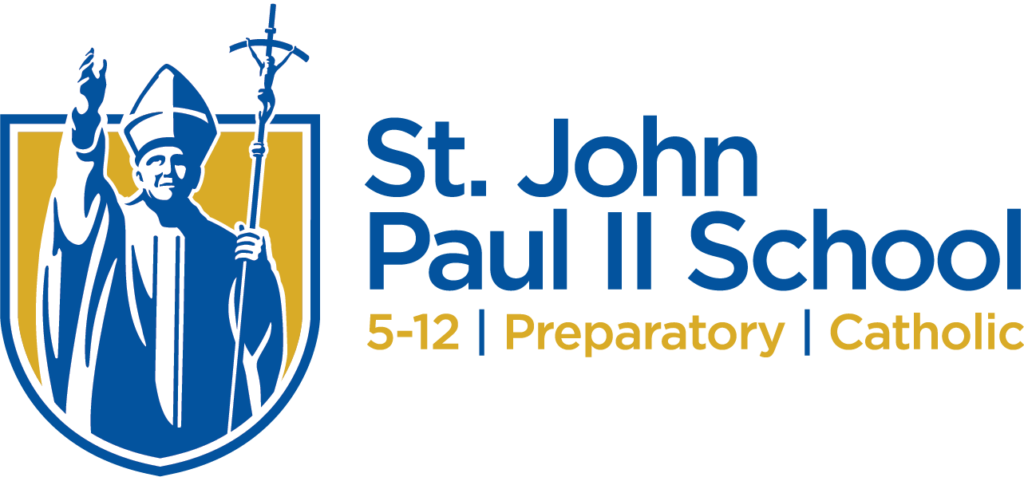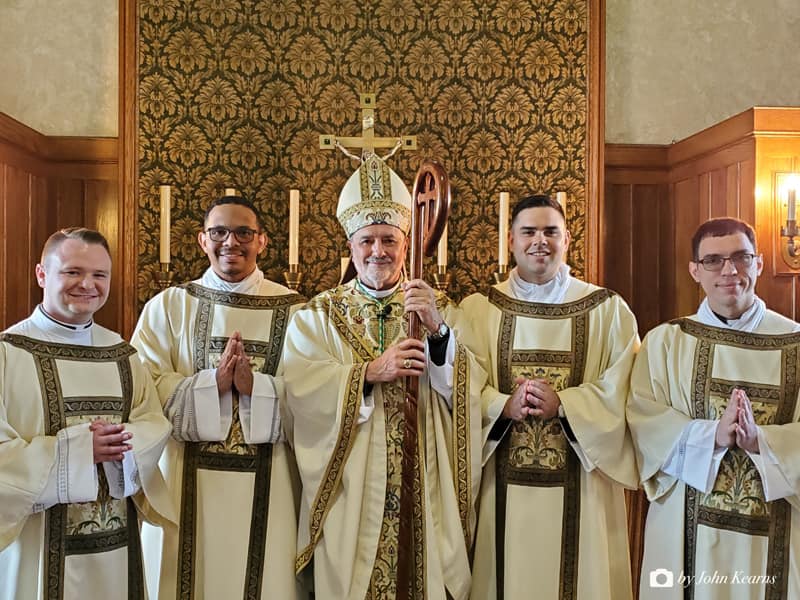Rachael Devaney
Cape Cod Times
FALL RIVER — The journey toward the priesthood was slow and long for Kevin Cook, pastor of Our Lady of Mount Carmel Parish in Seekonk.
“I was living with one of my brothers and I told him I was thinking about going into the seminary,” he said. “The moment I told him, there was extraordinary peace that I never had before. A unique experience of grace.”
Now, as director of vocations and seminarians for the Diocese of Fall River, Cook helps other men with their own calling to the vocation, including Matthew Laird, 29, of Sandwich; and William O’Donnell, 44, of Harwich, who will be ordained Saturday, June 4, at St. Mary’s Cathedral in Fall River.
Bishop Edgar M. da Cunha, center, is photographed with ordained deacon Christopher Hughes, left, deacon Thiago Menezes Santos, second from left, deacon John Garabedian, second from right, and deacon Brian Connors, right.
Chris Hughes, 27, of Sandwich is also studying for the priesthood and was ordained as a transitional deacon on May 21 at Cathedral of St. Mary of the Assumption in Fall River. Hughes will remain a deacon for about a year before he takes vows to become a priest.
Common threads
Cook, who was ordained as a priest in June 2001, said he spends much of his time involved in vocational work. He said there’s no cookie-cutter mold that defines men who enter the priesthood. Their cultural backgrounds, education and family lives are diverse. The common thread, he said, is how they grow closer to God.
“When guys are being called to the priesthood or men and women are called to religious life, there’s indicators along the way,” he said. “There’s a commonality in how they start to sense the way God is moving their hearts.”
William O’Donnell’s calling to God
For O’Donnell, the call didn’t come right away. He obtained a degree in marketing but began working towards a degree in theology in 2012. During that time, O’Donnell said he began to pray and listen to God. It wasn’t long into his first semester, in 2016, that he enrolled in the seminary.
“I wound up spending a ton of time in the chapel my first year, in prayer. Just talking to God, asking him for the strength to make this change,” he said. “To give up everything from my old life and then to embrace the life he was calling me to.”
“All these new things and wonderful things kept coming into my life,” he said.
Matthew Laird’s calling to God
Laird, who plays bass guitar for the four-clergy member jazz band called Vatican III, also experienced God’s call and said it was a process of authenticity and recognition that helped him answer that call.
“God calls each of us for our gifts and talents and for our idiosyncrasies,” he said. “Just becoming comfortable with my own identity was a big part of it, too.”
Chris Hughes’ calling to God
Hughes has been in the seminary since August 2017 preparing to make three promises to God: a promise of celibacy, obedience and a life of prayer.
“Those are promises I will make that will last the rest of my life,” Hughes said.
Since a young age, Hughes had been active at Christ the King Parish in Mashpee and said it was mentors such as Monsignor Daniel Hoye and Father Edward Healy who inspired him.
“I always felt this great calling to serve others and in high school I started to pray about it,” he said. “I was always involved in the parish and I saw meaningful ministry with these priests I had in my life. I fell in love with parish life.”
Seminary and societal challenges
O’Donnell said he did face challenges.
“The schedule is very particular – kind of regimented in a way,” he said. “You have to be where they tell you to be at, at a certain time and that took a bit of getting used to.”
But O’Donnell said the schedule was also very monastic.
“I was really able to let go of a lot of things that I thought were important and embraced the life at the seminary,” he said.
As a young man, Laird said he struggled a bit to find his own particular style as he entered the seminary. He found himself resisting temptations, he said, to fit into a particular box of what others thought the priesthood should be. He said he grew strength, by bonding with others.
“We were going through this process together and we strengthened each other along the way,” he said. “Seeing that friendship evolve, helped us take on new responsibility.”
Laird had served as a deacon at a New Bedford parish that was composed of people from the Azores — islands off the coast of Portugal. By taking time to learn Portuguese, and engage in the congregation’s culture, he was able to get out of his comfort zone.
“Part of their faith relied on their own culture. They did Holy Ghost festivals and other things and I thought that was such a great experience,” he said. “I feel like I’m able to serve that kind of church community in the future.”
As a transitional deacon, Hughes can now assist priests at Mass. And as a minister of the Eucharist, he can proclaim the gospel and preach, baptize and minister at other services. He will serve one more year in seminary at the The Immaculate Conception Seminary School of Theology in South Orange, New Jersey, he said, and eventually will be assigned to a parish within the Diocese of Fall River, once he is ordained.
Societal pressures can come into play when men are considering the priesthood, Cook said. In the past, he said, America’s culture welcomed those committed to God, but more recently the public can be indifferent.
“Probably 40 years ago, they knew there were challenges but you had more support in the culture of it,” he said. “Taking that step to become a priest was easier.”
Vocation leaders like Cook regularly address these issues with seminarians and try to guide them around obstacles that may stand in their way. When there’s a true calling from God, he said, students find peace and joy.
Solutions for those called by God
Cook said there are practical elements that connect seminarians to a manifestation of their actions, their growth and maturity. When they start to sense a calling, there can be internal struggles. For Cook and the priests he works with, the main priority for seminarians is to find a sense of self and to evaluate their connection with God.
“When they grow closer to God, they sense that God might be asking more of them, and for some, there can be a little bit of fear,” he said. “But once they’ve reached that next step, we are there to help.”
Throughout the process, Cook meets with seminarians and evaluates whether they are ready to go to the next step. Sometimes they’re not.
“If they aren’t ready, you don’t want to encourage them to take the next step, because that could be detrimental,” he said. “For others, it’s clear that they need encouragement to take that next step.”
Cook often evaluates their character, does psychological evaluations, and helps candidates develop more of an awareness of what’s happening to them spiritually. Seminarians are also assigned to work outside the parish at hospitals, prisons or at work assignments with youth. The objective, he said, is to make sure they can work well with people, and can handle responsibilities in a healthy way.
“They have to be good with people. If they aren’t, it might not be healthy for them, and it might not be good for the people,” he said. “It’s at that point that some men start to realize this is not for them. But at least it’s a step in their life that leads to a greater future.”
Rebuilding from controversy
The Roman Catholic Church has endured the sexual abuse scandal, societal and cultural changes and the effects of the COVID-19 pandemic, said Cook.
All areas of controversy over the years, he said, have reduced the number of men entering the seminary.
“COVID was a major blow in regards with the consistent ways we are meeting with different individuals,” said Cook. “People were not in the church, so part of that faith for the seminarians, and that growing in that worship of God was not happening.”
For O’Donnell, his studies at the seminary have shown him that, historically, there’s always been dissension within the church. Throughout time, men and women have made commitments to God, and faced great adversity, he said. Their trials and tribulations only brought them closer to God, he said.
“We have been marked by great division and upheaval but when we leave seminary, myself, and all my brothers know we have to carry that cross and we’re ready for it,” he said. “The calling is strong enough to overcome.”
According to the Center for Applied Research in the Apostolate, the number of priests in the United States in 1970 was 59,192. Since then, numbers have consistently declined. In 2021, there were only 34,923 priests recorded by the Center. With a booming population and a national shortage of priests, Cook said the Diocese is often stretched thin. Priests end up ministering to multiple parishes.
“There is that human pressure of knowing we need more priests.” Cook said. “But, if you want to ask if there’s a shortage, the answer will always be yes. Because there is always more work that can be done.”
One tactic that has encouraged more men to enter the seminary, said Cook, is an adjusted financial approach to education for seminarians. In order to become a Catholic priest, seminarians must obtain a college degree, study philosophy for two years, and then enter into a major seminary, where they study theology for four years.
The church didn’t previously pay for major seminary, but the Diocese now helps candidates financially with their education, room and board, Cook said.
The Diocese also doesn’t require seminarians to pay the church back, should they decide against taking final vows. The purpose is to allow seminarians to have full freedom of thought as they process their connection to God, he said.
“Maybe he’s struggling and thinking, ‘I don’t know if I can afford to pay them back, I’ll just stick with it,'” he said. “But we don’t want them to stick with it if they are having doubts.”
Laird, a transitional deacon who will take his final vows Saturday, said God’s calling remained strong throughout his time at the seminary, but the same doesn’t hold true for others.
“Some people think that once you enter the seminary, your mind is made up about becoming a priest. It’s not that cut and dried,” he said. “But, no matter what you decide, it’s never a waste of time. You’re going to come out having a better knowledge of yourself.”


